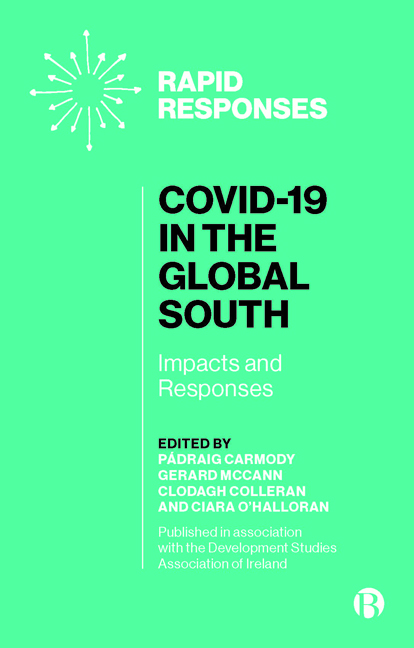6 - The Challenge of COVID-19 in Informal Urban Settlements and the Need for Co-produced Local Responses
Published online by Cambridge University Press: 23 March 2021
Summary
COVID-19 emerged in China and spread first to high and middle-income countries. Many of the initial control recommendations (to wash hands, self-isolate and physically distance) assumed access to essential services (for example, water, space). These protective measures are not equally possible in low-and middle-income countries (LMICs), and especially not in informal settlements because of limited infrastructure. With one billion people living in informal settlements – 30–70 per cent of inhabitants in some cities (Satterthwaite et al, 2020) – there is an urgent need to consider how to appropriately address the pandemic in these areas.
Urban growth has been increasingly unplanned in many countries, with poverty concentrated in informal settlements. Cities are often segregated along wealth and social lines (including race). Images of ‘slums’ depict them as chaotic, dirty and disease ridden, and as a social, environmental and developmental threat to the rest of the city. Such views have informed attempts to deny residents tenure and carry out evictions. A defining challenge of informal settlements and ‘slums’ is the lack of data about them prior to, and during, emergencies. Due to their illegal or informal status there are often no reliable data about the number of people who live there or their health. This makes it difficult to prepare for an outbreak and could lead to inappropriate and harmful responses.
Vulnerability: what is known and what is not known
The first half of this chapter outlines different forms of vulnerability and identifies groups that may be more severely affected by COVID-19.
Epidemiological vulnerability
The people most vulnerable to severe disease and death are those over 70 years or with cardiovascular disease, diabetes, chronic respiratory disease, hypertension or cancer (Jain and Yuan, 2020). Men appear almost twice as likely to die from COVID-19 than women (Purdie et al, 2020). Although the population of LMICs is young when compared to that in high-income countries (HICs), they account for 69 per cent of the global population over 60 (Lloyd-Sherlock et al, 2020). There is a perception that cities have younger populations than rural areas; however, age distributions between urban and rural populations in LMICs are similar (DESA, 2017). Each city will have different age distributions, but it would be unwise to discount the age-related risks.
- Type
- Chapter
- Information
- COVID-19 in the Global SouthImpacts and Responses, pp. 63 - 74Publisher: Bristol University PressPrint publication year: 2020



